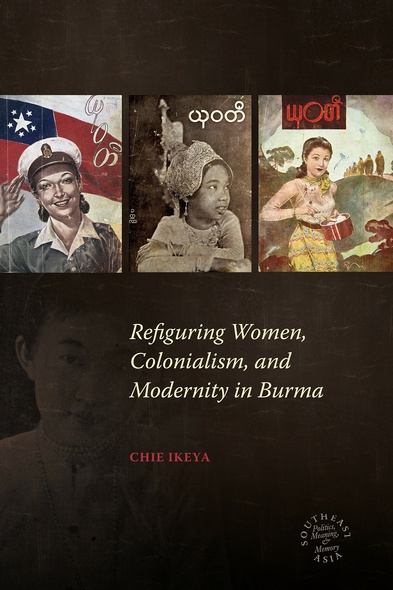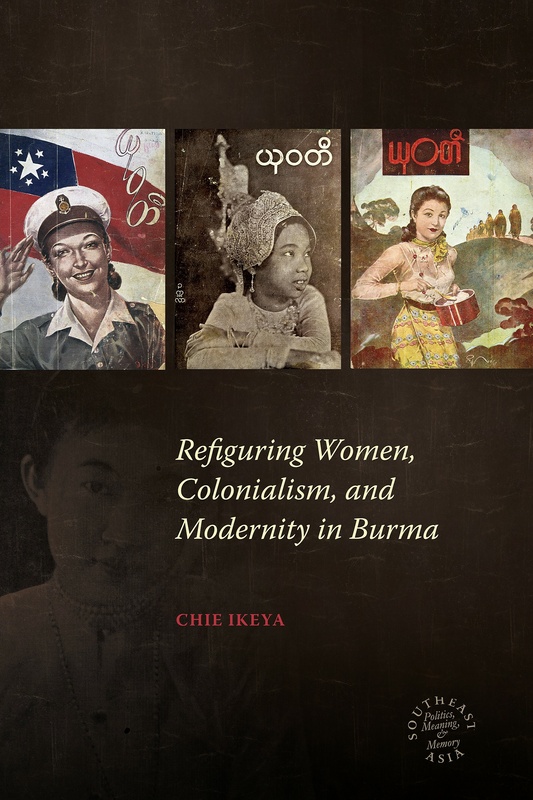
Refiguring Women, Colonialism, and Modernity in Burma presents the first study of one of the most prevalent and critical topics of public discourse in colonial Burma: the woman of the khit kala—"the woman of the times"—who burst onto the covers and pages of novels, newspapers, and advertisements in the 1920s. Educated and politicized, earner and consumer, "Burmese" and "Westernized," she embodied the possibilities and challenges of the modern era, as well as the hopes and fears it evoked. In Refiguring Women, Chie Ikeya interrogates what these shifting and competing images of the feminine reveal about the experience of modernity in colonial Burma. She marshals a wide range of hitherto unexamined Burmese language sources to analyze both the discursive figurations of the woman of the khit kala and the choices and actions of actual women who—whether pursuing higher education, becoming political, or adopting new clothes and hairstyles—unsettled existing norms and contributed to making the woman of the khit kala the privileged idiom for debating colonialism, modernization, and nationalism.
The first book-length social history of Burma to utilize gender as a category of sustained analysis, Refiguring Women challenges the reigning nationalist and anticolonial historical narratives of a conceptually and institutionally monolithic colonial modernity that made inevitable the rise of ethnonationalism and xenophobia in Burma. The study demonstrates the irreducible heterogeneity of the colonial encounter and draws attention to the conjoined development of cosmopolitanism and nationalism. Ikeya illuminates the important roles that Burmese men and women played as cultural brokers and agents of modernity. She shows how their complex engagements with social reform, feminism, anticolonialism, media, and consumerism rearticulated the boundaries of belonging and foreignness in religious, racial, and ethnic terms.
Refiguring Women adds significantly to examinations of gender and race relations, modernization, and nationalism in colonized regions. It will be of interest to a broad audience—not least those working in the fields of Southeast Asian studies, colonial and postcolonial studies, cultural studies, and women’s and gender studies.
Chie Ikeya’s excellent book offers deep insights into Burma’s social and cultural history under colonialism and modernity mainly through depictions of modem Burmese women. Based on archival research and a meticulous compilation of facts and figures taken from primary sources, the book makes a unique contribution to our understanding of the struggle and progress made by Burmese women in the early part of the twentieth century. . . . Overall, the book provides a fascinating social history of late-colonial Burma, providing insights into the strength and resilience of middle-class Burmese women who rose to the challenges of modernity and led the way toward self-fulfillment and advancement. It is also a valuable contribution to Burmese studies and modem colonial history in general, and gender and cultural studies in particular, and helps show modem Burma in a different light-open, dynamic, and resourceful.
This new history of women and modernity in British Burma is a wonderful addition to the field of Southeast Asian studies. Ikeya (National Univ. of Singapore) has a deep knowledge of Burma and Burmese language. Her abilities have led her to uncover an amazing treasure trove of colonial-era articles and advertisements speaking to and about Burmese women in the final decades of colonial rule. Because so few histories of Burma have been written and even fewer grapple with Burmese-language sources, Ikeya’s examination of this material offers groundbreaking insights while posing many interesting avenues for further exploration, discussion, and research.
Refiguring Women, Colonialism, and Modernity in Burma presents the first study of one of the most prevalent and critical topics of public discourse in colonial Burma: the woman of the khit kala—‘the woman of the times’—who burst onto the covers and pages of novels, newspapers, and advertisements in the 1920s. . . . Refiguring Women adds significantly to examinations of gender and race relations, modernization, and nationalism in colonized regions. It will be of interest to a broad audience—not least those working in the fields of Southeast Asian studies, colonial and postcolonial studies, cultural studies, and women’s and gender studies.
Refiguring Women, Colonialism, and Modernity is an important publication . . . Ikeya’s book is a sophisticated, nuanced work which is based on a considerable amount of Burmese-language source materials, and it is also accessibly written.
Refiguring Women, Colonialism, and Modernity in Burma not only marks a milestone in Burmese historiography but makes a significant contribution to our appreciation of how ‘being modern‘ was understood in colonized societies. Deftly integrating visual and literary representations of Burmese women with the experiences of a people living under colonial control, this pioneering study explores previously untapped sources to provide new insights on the entangled relations between gender, colonialism, and modernity. Developments in Burma in the late nineteenth and early twentieth centuries are discussed in a comparative framework that illuminates both differences and similarities with other areas of the non-European world. Meticulously researched and written in clear and accessible prose, this landmark book will be a valuable addition to a variety of scholarly fields, including post-colonial, Southeast Asian, and gender studies.
This is an outstanding work that will be important not only for Burma studies but for Southeast Asian studies more broadly, as well as for scholars interested in colonialism, gender, and race relations. The arguments are well structured and articulate, and Ikeya’s analysis of the role of consumer advertising and consumption in the definition of ‘modern women' is particularly impressive.
Chie Ikeya is assistant professor in the Southeast Asian Studies Programme at the National University of Singapore.




